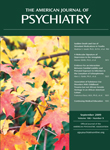Long-Term Antidepressant Use and Risk for Diabetes: Cause for Concern and Optimism
To the Editor: I commend Frank Andersohn, M.D., et al. (1) for their article, published in the May 2009 issue of the Journal , which examined the risk of diabetes with long-term use of antidepressants. The evidence for overall increased risk with antidepressant use is a cause for concern, but it is heartening to see evidence for differential effects of individual agents, especially the possibility that three commonly used antidepressants, citalopram, fluoxetine, and sertraline, may not increase the risk for diabetes.
The authors provided several reasons for their findings. I feel that three additional aspects also merit consideration. First, development of diabetes is determined by two equally important variables, insulin resistance and insulin secretion; the former correlates well with weight and the latter does not (2) . Second, even within a class, individual antidepressants differ in their binding affinity at different receptors (3) . Third, different receptors are known to mediate insulin resistance and insulin secretion; binding at the H 1 and 5-HT 2 C receptors mediates weight and insulin resistance, whereas M 3 muscarinic receptors in the pancreatic β cells play a critical role in regulating insulin secretion (4) .
Among the selective serotonin reuptake inhibitors (SSRIs), paroxetine has the greatest affinity at M 3 muscarinic receptors (3) , which may explain its increased diabetogenic risk.
Development of diabetes in the absence of weight gain among some users of antidepressants (5) may also be explained by separate receptor systems mediating insulin resistance and secretion. Because of its high M 3 receptor affinity, it is not surprising to see greater rates of diabetes with paroxetine even in the absence of weight gain.
Despite mounting evidence of the differential effects of antidepressants within a class, we continue to persist with the current classification. In their abstract, Dr. Andersohn et al. noted that increased risk of diabetes was observed with long-term use of tricyclic antidepressants and SSRIs but did not mention that three SSRIs, sertraline, citalopram, and fluoxetine, were not associated with greater risk for diabetes. Undoubtedly, their results need replication, but it is possible that good news got buried under the bad news.
Classifications can be misleading. With the growing understanding of differential effects of antidepressants within a class, it is time we stop assigning “guilt by association.”
1. Andersohn F, Schade R, Suissa S, Garbe E: Long-term use of antidepressants for depressive disorders and the risk of diabetes mellitus. Am J Psychiatry 2009; 166:591–598Google Scholar
2. Kahn SE, Hull RL, Utzschneider KM: Mechanisms linking obesity to insulin resistance and type 2 diabetes. Nature 2006; 444:840–846Google Scholar
3. Stanton T, Bolden-Watson C, Cusack B, Richelson E: Antagonism of the five cloned human muscarinic cholinergic receptors expressed in CHO-K1 cells by antidepressants and antihistaminics. Biochem Pharmacol 1993; 45:2352–2354Google Scholar
4. Jindal RD, Keshavan MS: Classifying antipsychotic agents: need for new terminology. CNS Drugs 2008; 22:1047–1059Google Scholar
5. Rubin RR, Ma Y, Marrero DG, Peyrot M, Barrett-Connor EL, Kahn SE, Haffner SM, Price DW, Knowler WC: Elevated depression symptoms, antidepressant medicine use, and risk of developing diabetes during the diabetes prevention program. Diabetes Care 2008; 31:420–426Google Scholar



